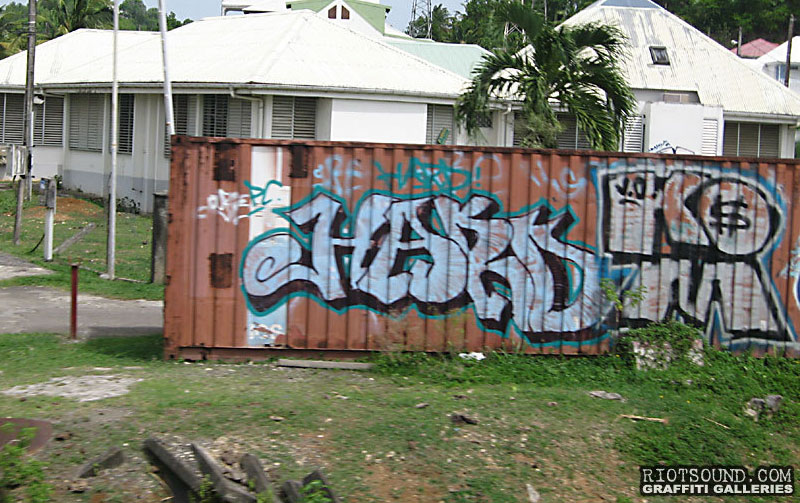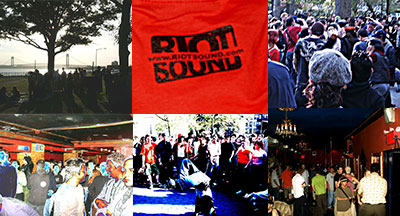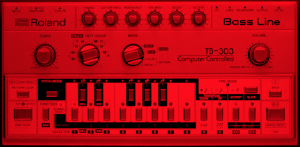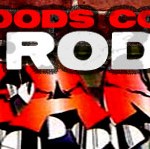by Alex Shtaerman
To say Y-Love is somewhat of an anomaly in Hip-Hop may be a gross understatement, even by today’s standards. Many might consider the path Yitz Jordan took in life to itself qualify as remarkable. Born to a Puerto Rican mother and an Ethiopian American father, Y-Love became drawn to the ancient religion of Judaism when he was just seven year old after seeing a commercial on TV celebrating the Jewish festival of Passover. And as unlikely as that first encounter may have been, Y-Love continued to study and pursue Judaism throughout his adolescence, officially converting to the religion after relocating from his hometown of Baltimore to Brooklyn, New York.
Out of all places, Y-Love’s indoctrination into Hip-Hop would take place during a subsequent pilgrimage to Jerusalem during which he further pursued his Judaic studies at the Yeshiva Ohr Somayach. By using rhymes and impromptu freestyles to aid in the memorization of ancient Hebrew texts such as the Talmud, the future MC had inadvertently developed a style of rhyming that intertwined a smorgasbord of languages including English, Arabic, Hebrew, Aramaic and Latin. Upon returning to the US in 2001, Y-Love was not particularly intent on a career in music, but just as a TV commercial had altered his life so many years earlier, it would be a chance freestyle session at an open mic venue that would ultimately change his life yet again. It “was totally Jewish and made heavy use of Talmudic and Kabbalistic quotes, mostly in Aramaic, and almost totally Torah related”, recalls Y-Love of his first performance, “it blew my mind that a club full of people was moving to Torah lyrics. Right then and there, the way I looked at Hip-Hop changed”.
Since 2001 Y-Love has worked with artists such as Lou Reed, DJ Spooky, Matisyahu and Immortal Technique, to name a few. 2008 would see the release of the Brooklyn based MC’s debut album, This Is Babylon, which Y-Love describes as a journey into “a futuristic zone of intellectual spirituality and mystical political revolution”. And while many fans in the U.S. continue to view contemporary Hip-Hop as progressively more commercialized and creatively stagnant, Y-Love effortlessly flips that pervasive stereotype on it’s head by drawing on a global assortment of influences to craft a sound that can only be described as uniquely his own. In his most recent endeavor, Y-Love teams with Crown Heights soul rapper DeScribe for the forthcoming EP Change. The title track is already garnering a considerable buzz as well as critical acclaim, so make sure you check it out! Recently we caught up with Y-Love to talk music, faith and much more. Check out the RiotSound.com interview!
Click here to listen to “Change”, fresh new music from Y-Love and DeScribe.
RIOTSOUND.COM: Growing up in Baltimore with parents of Ethiopian and Puerto Rican decent, you first began to gravitate towards Judaism at the age of seven after seeing a commercial on TV celebrating the Jewish festival of Passover. Just to put things in perspective, there is a longstanding Ethiopian connection to Judaism. Being of Ethiopian background, were you exposed to certain narratives from the Ethiopian tradition that also contributed to sparking your curiosity?
Y-LOVE: I can’t actually stress it enough, my initial affinity to Judaism was purely based on instant instinctive response. I saw a commercial on TV and immediately began drawing six pointed stars on everything. As I got older, the concepts of continuous renewal – being reborn every morning, the me yesterday is not the same as the me today – universal redemption and [the idea that] Moshiach [the messiah] is not just coming for the Jews or those who “believed in him” [but for everyone], and also the Torah being available to all, that appealed to me. And also very key is the concept of unlimited spiritual possibility.
Many world religions have built into them the concept of “you will never be as good as this guy”. “This guy” was the key to salvation, “this guy” revealed the path to enlightenment, etcetera. Judaism says one can be as righteous as Moses or as wicked as one wants, it’s all based on one’s free choice. As an adolescent I felt like Judaism was my religion that I grew up with. Initially it meant most directly not being Christian. I felt like I was entering a world more suited for me, where intellect reigned over form, and God became that which one studies and learns about rather than something one follows without answering questions.
RIOTSOUND.COM: What initially inspired you to become an MC?
Y-LOVE: I started rhyming in Yeshiva [Editor’s note: Yeshiva is a school that teaches the principles of Judaism with a primary focus on classic religious texts] in Ohr Somayach in Jerusalem in 2000. Me and my learning partner, a rapper from Long Island named Cels-1, used Hip-Hop as a way to memorize Talmud [a text that chronicles traditional Jewish law and ethics]. Between music and acting out the cases, we were memorizing and learning to the point where we rose four levels in Yeshiva in the time most study pairs go up one or two levels. Obviously not everyone in Yeshiva took well to this, but the proof is in the learning, I can still remember some cases I learned eight years ago. Beforehand I wasn’t really into Hip-Hop so much as a connoisseur. I always listened to some Hip-Hop, Luda, Busta and KRS were always big, but for the most part I came up listening to political punk rock and anything else revolutionary, like Crass, Conflict and Rage Against The Machine.
After coming back from Israel in 2001, Cels-1 and I were picking up someone from an open mic night and I saw two empty slots on the signup sheet. I put our names down on a whim. When I saw the crowd moving to my rhyming – which was totally Jewish and made heavy use of Talmudic and Kabbalistic quotes, mostly in Aramaic, and almost totally Torah related – it blew my mind that a club full of people was moving to Torah lyrics. Right then and there, the way I looked at Hip-Hop changed.
“Only about 10% of religious people really make religion into
a disciplinarian enterprise and the other 90% suffer, either
at the hands of the 10% or in the court of public opinion”
RIOTSOUND.COM: Being an artist as well as a man of faith, have you ever felt any kind of personal necessity to strike a balance between your art and your beliefs, or do the two always go hand-in-hand?
Y-LOVE: There was never a balance for me to strike; for me Hip-Hop began as a mode of spiritual expression, making Torah learning more relatable, rhyming about what I was seeing in Jerusalem, freestyling about Talmudic cases and personalities and what they would have been like. Any creative art is a mode of expression, making the words in the heart hit the page or the track. In high school I wrote poetry about what I was going through at the time and what I was thinking at the time. Today my poetry is Hip-Hop, and since Judaism is so central to my life and circumscribes almost all of my actions, it’s going to be what I rhyme about because it’s what’s in my heart and on my mind.
RIOTSOUND.COM: Your debut LP, This Is Babylon, dropped in 2008. For anyone who hasn’t had a chance to check it out, what can they expect to hear when they pop it into their CD player or rock it on their iPod?
Y-LOVE: A transition into a futuristic zone of intellectual spirituality and mystical political revolution. Most of my lyrics center around spiritual concepts and self empowerment, with the threads of unity and the destruction of prejudice woven in throughout. My song “6000” is a wakeup call to people who look to God for guidance in their lives – to say that this culture we live in, that which we see today, is not a status quo worth preserving. The song “Brooklyn to Ramle” features a Palestinian MC, Saz, and we talk about the destructive nature of prejudice, especially racism, and rising above it. The message overall, in a phrase, is “elevate yourself, don’t be deceived, fix the world”.
RIOTSOUND.COM: You’ve recently teamed up with Crown Heights soul rapper DeScribe for an EP that will be dropping in April titled Change. As artists the two of you compliment each other extremely well; how did the idea to do an entire EP originally come about?
Y-LOVE: Diwon put DeScribe and I together a few months back to collaborate on one song, “Change”. We do work well together and the one song turned into the EP. As people, Describe and I are about as different as two people could be, but that’s precisely what we want to show with this project. In the “Change” video we show that while we may come from drastically different points of view, we all come together at the Shabbat table. Like the president said, a patchwork is a strength not a weakness.
RIOTSOUND.COM: One of your stated goals as an MC is to bring the rich heritage of the Torah to as many people as possible. And while there are incredible insights present in many of the ancient religious texts, do you feel that those insights may be overlooked by younger generations because they often perceive religion to be too rigid or perhaps look at it as more of a “disciplinarian” enterprise?
Y-LOVE: I have a theory called the “Tyrannical Tenth”. Only about 10% of religious people really make religion into a disciplinarian enterprise and the other 90% suffer, either at the hands of the 10% or in the court of public opinion. Religion should ultimately boil down to being the driving force in your life to do good things. People only look at religion in such a way [as being disciplinarian] because what they are seeing is that tyrannical tenth being authoritarian, abusing people, ostracizing people, judging people and fishing for new souls to subject to their “salvation”.
What I hope to do through my music is to show people that spirituality is a beautiful thing; our spiritual portion is as real as the physical one we spend hours upon. I hope to show that the Orthodox Jewish world has diversity, not just physically but ideologically. The fact, for example, that we are expected to vote as a bloc is lamentable. The fact I was expected to be part of the bloc that went twice for Bush and was to go for McCain / Palin was, for me, unconscionable. I try to show, through Hip-Hop, how my own Torah study is bringing the texts to life for me. The main goal of learning Scripture is to learn about God and spirituality. So if one doesn’t learn well from looking at words on a page and would learn better at a Hip-Hop spot watching a sick MC, then so be it.
“Other than matters of religious law, which itself is
multifaceted and holds many opinions and precedents
as it is case law, there’s not too much that knowing
one’s religion can make you expect. I more hope
to change ‘the box’ and to re-brand Judaism in the
eyes of people who consider it to be an antique”
RIOTSOUN.COM: With spiritually being one of your focal points as an artist, do you ever worry that critics may pigeonhole you or put you in a box, so to speak, perhaps labeling you as a religious rapper?
Y-LOVE: We recently played a show at Dartmouth [College] and I was hanging out with the kids from Hillel [The Foundation for Jewish Campus Life] and some frat kids, and one girl kept staring at me, eventually blurting out “I just can’t get over you being Orthodox! You are so different than all the Orthodox Jews I’ve ever met!” So, while I may be a Sabbath keeping, pork avoiding Orthodox Jew, whatever category you think that puts me in is going to eventually prove false. This is a main source of contention – people thinking, oh you’re Orthodox so I assumed you would or wouldn’t be such and such. Other than matters of religious law, which itself is multifaceted and holds many opinions and precedents as it is case law, there’s not too much that knowing one’s religion can make you expect. I more hope to change “the box” and to re-brand Judaism in the eyes of people who consider it to be an antique. Besides, in ten years, maybe I will have created a new “box”. Will a kid be rapping in his Yeshiva [one day] and hearing from his rabbi, “look, if you keep rapping, people are going to compare you to Y-Love”?
RIOTSOUND.COM: Recently Israel was engaged in a three week military campaign against Hamas extremists who were firing rockets into Israeli cities from the Gaza strip. With military conflicts flaring up so frequently and tensions running so high, do you think it will ever be possible for there to be a mutual and sincere peace that both sides will agree to abide by?
Y-LOVE: Will there ever be peace between the State of Israel and the Palestinian Authority? Perhaps the best we can hope for is an indefinite ceasefire. Peace between states, in my opinion, is less important than good relations between people. I think that, more than peace, true and lasting friendship can exist on both sides if people can see each other as fellow creations of the one God all monotheists believe in. We Jews believe that all humans are created in the image of God and that all humans were minted from Adam to show that no one can say they are from a better lineage. The Qur’an also stresses that all humans are created by God and distinguishes that there are righteous “people of the Book”. I believe our holy books could drive us toward peace and unity, as opposed to so many people who are hell-bent on making that not happen. Religion does not have to be a divisive force. On the contrary, love of God could build the bridges.
RIOTSOUND.COM: Do you have any final words for anyone who may be reading this?
Y-LOVE: Use Hip-Hop to elevate and not tranquilize. The music is the means to the message. We are the change that is happening and if we want the future to be anything less than apocalypse we must put aside all prejudices and divisions and unite across all lines to make the world the place we want to live in. All hatred is destructive. Unity and love are the keys to survival, not just success.
For more news and info on Y-Love check out www.YLoveMusic.com, www.MySpace.com/YLove and www.MySpace.com/DeScribeYLove


































Comments